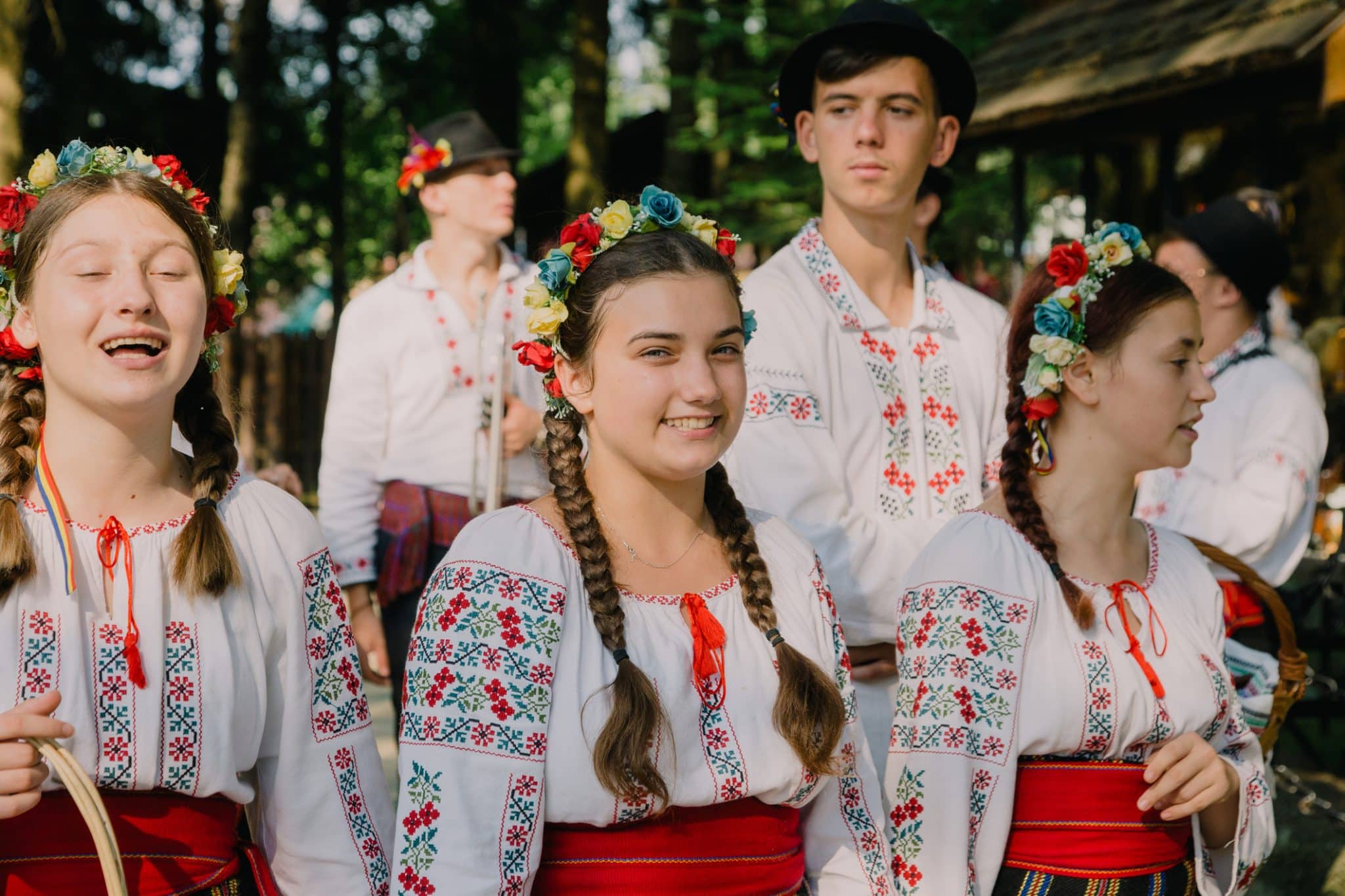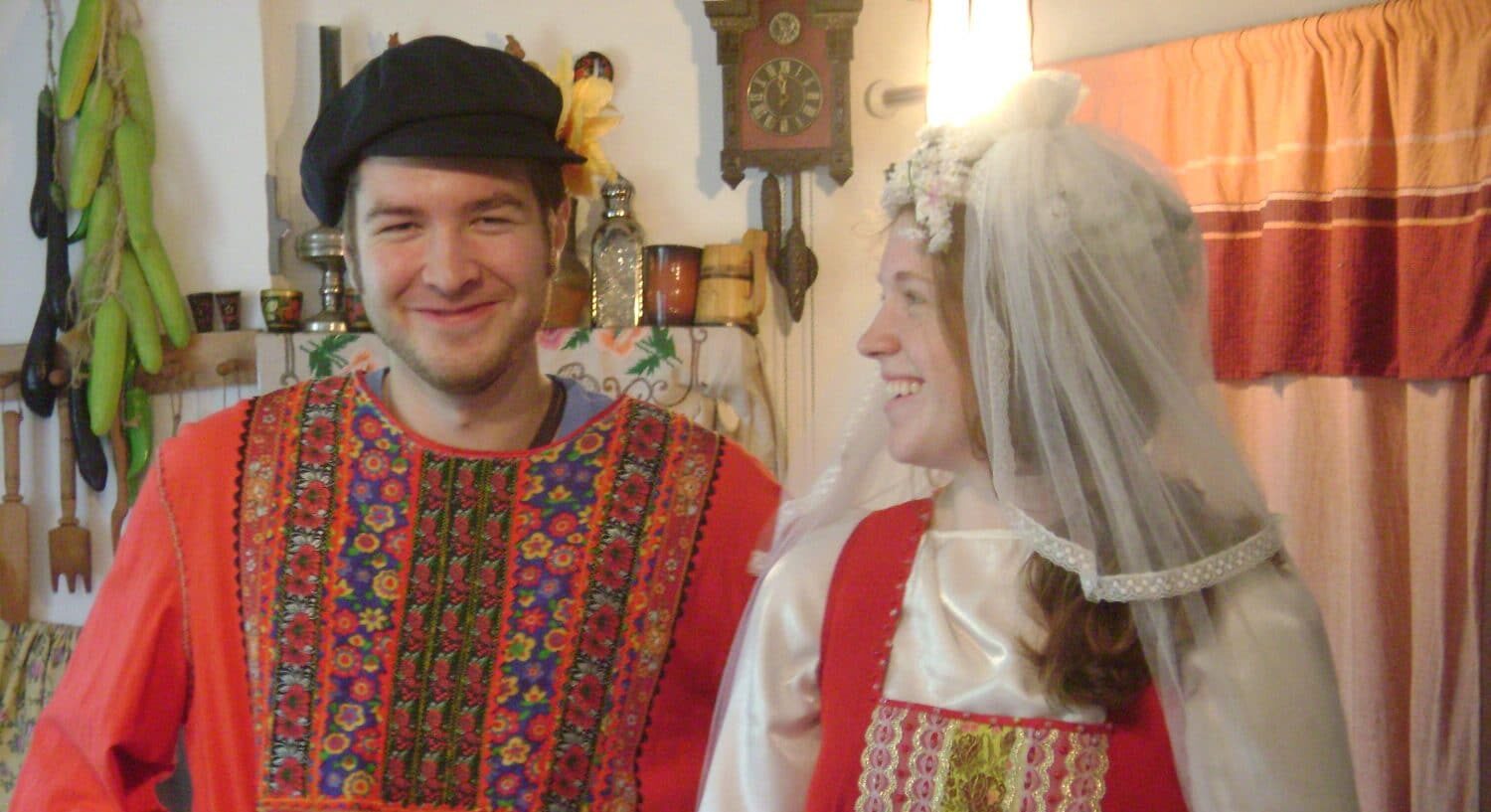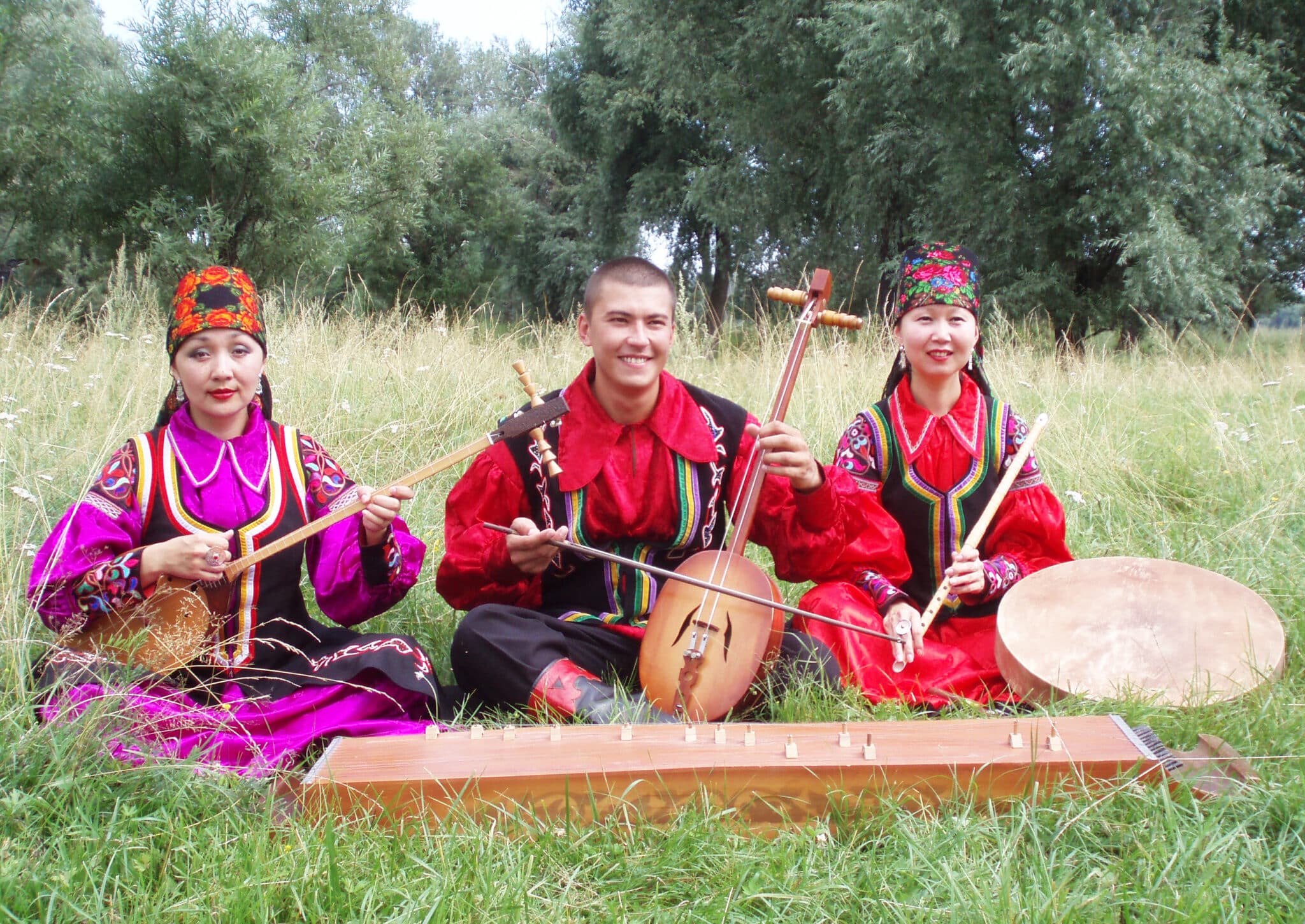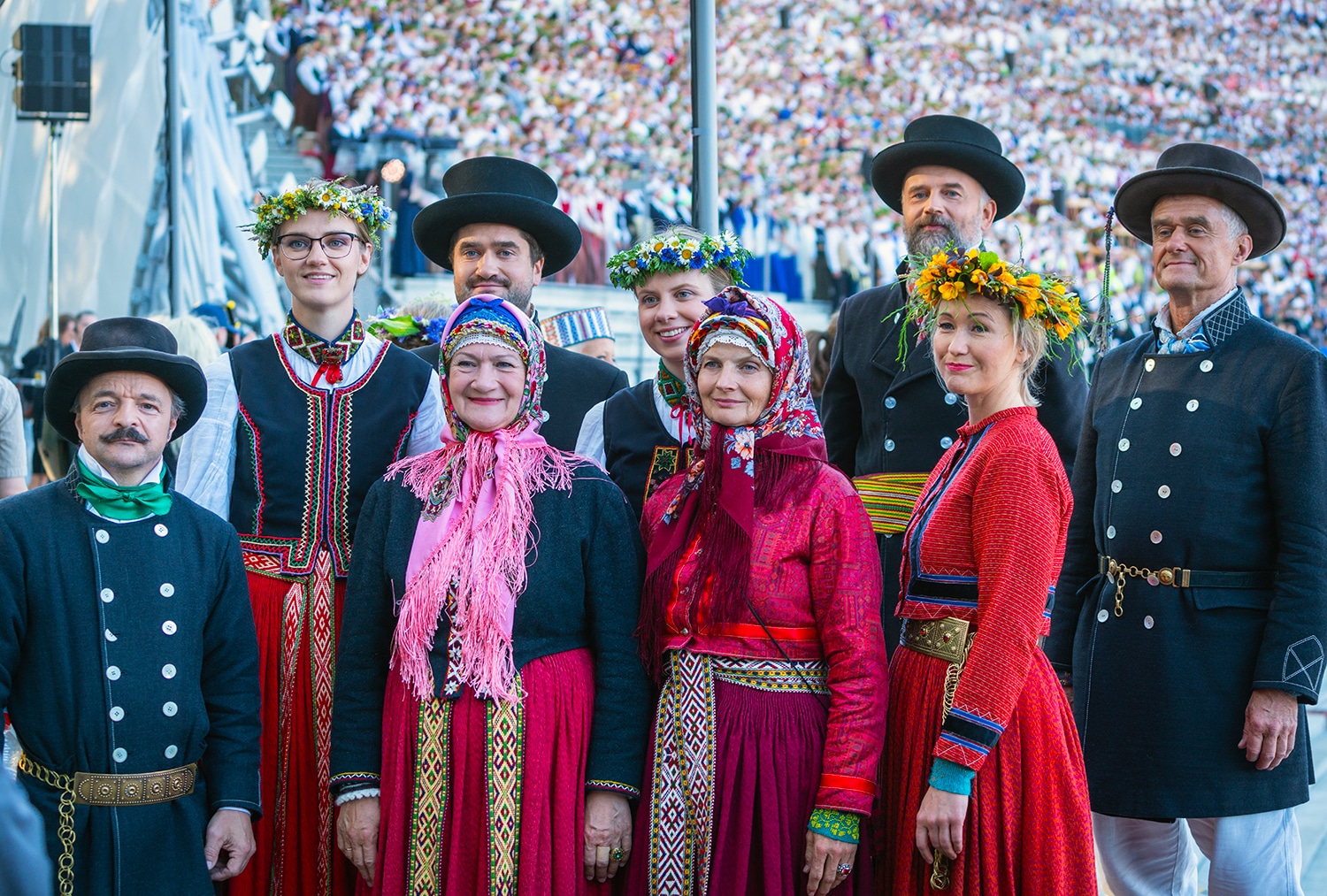The Talking Phrasebook Series presents useful phrases and words in side-by-side translation and with audio files specifically geared to help students work on listening skills and pronunciation. Below, you will find several useful phrases and words. To the left is the English and to the far right is the Latvian translation.
In the center column for each row is a play button. The recorded file will feature first English, then the Latvian in three versions: one slow, one with each syllable broken out, and a last version that will be spoken as it might be overheard in a conversation between native speakers.
10 Facts About Latvian
- Status: Latvian is an Indo-European language (like English). It is part of the Balto-Slavic branch of that family. There were once perhaps a dozen Baltic languages. Today, most agree, just two remain: Latvian and Lithuanian, which were formed as the Baltic languages consolidated.
- Ancient Tongue: Latvian is one of the oldest Indo-European languages still spoken today and retains features from the Proto-Indo-European language spoken thousands of years ago.
- Speakers: Today, Latvian has an estimated 1.6 million speakers. About 1.1 million of those live in Latvia, where ethnic Latvians make up about 62% of the population. Russian speakers make up about 35% of the population. Latvian diasporas exist throughout Europe and the US. Latvian is a recognized minority language of Estonia.
- Bilingualism: Many Latvians are bilingual. Most Latvian schools require students to study second and sometimes even third languages. Many older Latvians can speak Russian. Younger generations, however, are increasingly choosing to study English or German. That said, Latvia itself will likely remain a bilingual country for the foreseeable future due to its very large Russian-speaking minority.
- Foreign Influence: Latvian has absorbed many loan words. They can often be identified if they contain the letters F or H. Latvian did not originally contain these sounds. They and their corresponding letters were only introduced to the language to preserve the pronunciation of loanwords. Knowing this, you may be surprised by how common these letters are in modern Latvian.
- Complex cases: Like most Balto-Slavic languages, Latvian has a complex system of cases. Latvian specifically has seven: nominative, genitive, dative, accusative, instrumental, locative, and vocative.
- Gender: Latvian nouns are either male or female. Nearly all decline according to case with a significant number of exceptions.
- Adjectives as Articles: In Latvian, adjectives agree with case, gender, and number and indicate whether the noun is definite or indefinite. Thus, although Latvian does not have articles like English (a, an, the), its adjectives function to apply the same meaning within the language.
- Showing Respect: Latvian has effectively four pronouns to show various levels of formality and respect: tu, Tu, jus, and Jus. Jus is always capitalized when used to address a single person and is considered the politest of the pronouns. When written with a small letter (jus), it is used to refer to a group in the second person. With a small letter, “jus” is still formal, but can be used to refer to a group of teachers or friends. Tu is much the same, where the capitalized “Tu” is used for things like dinner invitations and birthday cards as a sort of fancier and slightly more formal mode of address. As a rule of thumb, never address anyone in Latvia with the personal and informal “tu” (or “Tu”) unless you have specifically been invited to do so.
- Dialects: Modern Latvian formed as the older language of Latgalian absorbed the other Baltic languages that were once spoken within the territory of Latvia. Dialects still exist in some areas based on how much influence the other languages maintained within their individual geographic area. For instance, in Eastern Latvia, influences of the Selonian language can still be felt while in Central and Southwest Latvia, Curonian and Semigallian influences still exist. Livonian, spoken in northern Latvia, has typically been regarded as a dialect of Latvian. However, there is a movement to have it recognized as its own language. It is also perhaps telling that the dialect has retained its own name.
Unique Characters in Latvian
Latvian uses a Latin alphabet similar to English, but with several unique characters or pronunciations. These can be broken into several categories for easy understanding:
Ā, Ē, Ī, and Ū each have counterparts without the long sign added above them. The long sign indicates that the vowel is held slightly longer than its counterpart. This is simple to understand in theory, but can be difficult to implement in practice as the subtle differences can change the meaning of words.
- “A” says “ah” while “Ā” is held slightly longer: “aah”
- “E” says “eh” while “Ē” says “ehh”
- “I” says “ee” while “Ī” says “eee”
- “U” says “oo” while “Ū” says “ooo”
Č, Š and Ž also have counterparts without the caron or “roof” over them. The addition of the caron is the same as adding a “h” to the corresponding counterpart in English. Note that “C” has special pronunciation by itself.
- “C” says “ts” while “Č” says “ch”
- “S” says “s” while “Š” says “sh”
- “Z” says “z” while “Ž” says “zh”
Ģ, Ķ, Ļ and Ņ each have counterparts without the cedilla or “comma” mark. This mark makes the letter palatized. These can be the most difficult as they lack direct equivalents in English.
- “N” says “neh” while “Ņ” says “enya” (the same sound as the Spanish “ñ.”)
- “L” says “leh” while “L” makes the same sound as the Russian “ль.” In English, the closest approximation can be found in the pronunciation of the second “l” in “million,” made as the tongue is forced to slide forward as the word is formed.
- “K” says “kuh” while “Ķ” says “tsya.”
- “G” says “guh” while “Ģ” says something like “dziya”
J and R also have pronunciation that differs from their English equivalents.
- “J” in Latvian sounds similar to the “ll” sound in the word “tortilla.” The hard “J” sound is made with two letters: “Dž.” This creates a “dzh” sound, similar to how Russian creates the same sound.
- “R” in Latvia is rolled, similar to Spanish and Russian.
Survival Basics in Latvian
| Hello! | Čau! *informal, conversational – to greet a friend |
|
| Hello! | Sveiki! *formal – to greet a teacher/passer-by, also used to greet a group |
|
| Yes | Jā | |
| No | Nē | |
| Good morning! | Labrīt! | |
| Good afternoon! | Labdien! | |
| Good evening! | Labvakar! | |
| What’s up? | Kas tev noticis?
*sing./informal |
|
| What’s up? | Kas jums atgadījies?
*pl./formal |
|
| How are you? | Kā tev iet? *sing./informal
Kā jums iet? *pl./formal |
|
| Good, thanks, and you? | Labi, paldies, un tev?
*sing./informal |
|
| Good bye! | Atā! *informal, conversational |
|
| Good bye! | Visu labu! *formal |
|
| See you later! | Uz redzēšanos! | |
| Sorry! | Piedod! *informal | |
| Sorry! | Atvainojiet! *formal | |
| Open/closed | Atvērts/Aizvērts | |
| Pull/push | Vilkt/Grūst *when referring to a door |
|
| Small/big | Mazs/Liels | |
| Do you speak English? | Vai jūs runājiet angliski? *pl./formal | |
| I don’t speak English. | Es nerunāju angliski. | |
| I only speak a little Latvian. | Es mazliet runāju latviski. | |
| I understand/I don’t understand. | Es saprotu/Es nesaprotu. | |
| Thank you!/Thank you very much! | Paldies! *informal
Liels paldies! *informal |
|
| Very well, thanks! | Ļoti labi, paldies! | |
| Good/bad | Labi/Slikti | |
| Please | Lūdzu *when asking for something politely |
|
| You’re welcome! | Lūdzu! *when responding to “Paldies!” |
|
| Think nothing of it! | Nav par ko! *when responding to “Paldies!” |
|
| Excuse me! | Atvainojos! | |
| A little | Mazliet | |
| Could you speak more slowly? | Variet runāt lēnāk? *pl./formal | |
| Could you repeat, please? | Atkārtosiet, lūdzu? *pl./formal | |
| Could you write that down? | Variet pierakstīt? *pl./formal | |
| My bag was stolen | Mana soma tika nozagta. *bag is fem. so the participle will end in -a |
|
| My wallet was stolen | Mans maks tika nozagts. *wallet is masc. so the participle will end in -s |
|
| My passport was stolen | Mana pase tika nozagta. *passport is fem. so the participle will end in -a |
|
| I need a doctor! | Man vajag ārstu! | |
| Call the police! | Piezvaniet policijai! |
Introductions in Latvian
| What is your name? | Kā tevi sauc?
*sing./informal |
|
| Pleased to meet you! | Prieks iepazīties! Latvians may respond to that with “Abpusēji” (It’s mutual). |
|
| I am 25 years old. | Man ir 25 gadi *literally: I have 25 years (you may hear a less common phrasing Es esmu 25 gadus jauns/vecs. This is literally “I am 25 years young/old) |
|
| How old are you? | Cik tev ir gadu? *sing./informal
*translates to how many years you have, |
|
| Where are you from? | No kurienes tu esi?
*sing./informal |
|
| I am American. | Es esmu amerikānis/amerikāne.
*masc./fem. in modern form (note that the older forms amerikānietis/amerikāniete are still sometimes used as well) |
|
| No, I am from Canada. | Nē, es esmu no Kanādas. | |
| She is Australian. | Viņa ir austrāliete. | |
| He is Irish. | Viņš ir īrs. | |
| We are from New Zealand. | Mēs esam no Jaunzēlandes. | |
| They are from Wales. | Viņi ir no Velsas. | |
| How do you like Latvia? | Kā tev patīk Latvija? *sing./informal | |
| I like Latvia very much. | Man ļoti patīk Latvija. | |
| Have you ever been to Sigulda? | Vai tu esi bijis Siguldā? *sing./informal
*“bijis” indicates that you are asking a man. “bijusi” would be used if a woman was asked. |
|
| I have never been to Jelgava before. | Es nekad iepriekš neesmu bijusi Jelgavā.
*“bijusi” indicates that the speaker is a woman. “bijis” would be used if a man is speaking. |
|
| This is my second time in Latvia. | Šī ir mana otrā reize Latvijā. | |
| What do you do? | “Kur tu strādā?” *literally: where do you work? |
|
| I am a student. | Es esmu students/studente. *masc. or fem. | |
| I am a businessman. | Es esmu biznesmenis/biznesmene. *masc. or fem. | |
| I am a teacher. | Es esmu skolotājs/skolotāja. *masc. or fem. | |
| I am a doctor. | Es esmu ārsts.
*commonly only used in masc. form, also for women, but you can use ārste for fem. form |
|
| I am on vacation. | Man ir atvaļinājums/brīvlaiks.
*literally: I have a vacation (from work)/I have a break (from school/studies) |
|
| I am here on business. | Es esmu šeit darba/biznesa dēļ. |
Asking Directions
| Where are the toilets? | Kur atrodas tualete/tualetes? *sing. or pl. both are correct forms | |
| Men’s | Vīriešu (tualete). | |
| Women’s | Sieviešu (tualete). | |
| Where is the nearest ATM? | Kur atrodas tuvākais bankomāts? | |
| Where is the nearest post office? | Kur atrodas tuvākais pasts? | |
| Where is the nearest train station? | Kur atrodas tuvākā vilciena stacija? | |
| Where can I find Wi-Fi? | Kur es varu atrast Wi-Fi/vaifaju? | |
| Do you know the Wi-Fi password? | Vai jūs zināt Wi-Fi paroli? *pl./formal | |
| How can I order a taxi? | Kā man pasūtīt taksi? | |
| Straight ahead! | Taisni uz priekšu! | |
| Take a right!/Take a left! | Grieziet pa labi/kreisi! *literally: turn to right/left! |
|
| After the stoplight | Pēc luksofora | |
| Next/First/Last | Nākamais/Pirmais/Pēdējais |
Shopping in Latvian
| How much does that cost? | Cik tas maksā? | |
| The menu, please! | Ēdienkarti, lūdzu! | |
| I’d like a beer, please. | Es vēlētos alu, lūdzu. | |
| I’d like the bill, please. | Varu samaksāt, lūdzu? *can i pay, please? | |
| Do you accept credit cards? | Vai drīkst norēķināties ar karti? *can i pay with card? |
Counting
| 0 | nulle | |
| 1 | viens | |
| 2 | divi | |
| 3 | trīs | |
| 4 | četri | |
| 5 | pieci | |
| 6 | seši | |
| 7 | septiņi | |
| 8 | astoņi | |
| 9 | deviņi | |
| 10 | desmit | |
| 11 | vienpadsmit | |
| 12 | divpadsmit | |
| 13 | trīspadsmit | |
| 14 | četrpadsmit | |
| 15 | piecpadsmit | |
| 16 | sešpadsmit | |
| 17 | septiņpadsmit | |
| 18 | astoņpadsmit | |
| 19 | deviņpadsmit | |
| 20 | divdesmit | |
| 21 | divdesmit viens | |
| 22 | divdesmit divi | |
| 30 | trīsdesmit | |
| 40 | četrdesmit | |
| 50 | piecdesmit | |
| 60 | sešdesmit | |
| 70 | septiņdesmit | |
| 80 | astoņdesmit | |
| 90 | deviņdesmit | |
| 100 | simts | |
| 111 | simt vienpadsmit | |
| 125 | simt divdesmit pieci | |
| 200 | divsimts | |
| 300 | trīssimts | |
| 400 | četrsimts | |
| 500 | piecsimts | |
| 600 | sešsimts | |
| 700 | septiņsimts | |
| 800 | astoņsimts | |
| 900 | deviņsimts | |
| 1000 | tūkstotis |
You’ll Also Love

The Talking Romanian (in Moldova) Phrasebook
The Talking Phrasebook Series presents useful phrases and words in side-by-side translation and with audio files specifically geared to help students work on listening skills and pronunciation. Below, you will find several useful phrases and words. To the left is the English and to the far right is the Romanian translation. In the center column […]

The Talking Russian Phrasebook
Learn Russian with this free phrasebook and its recordings made by a native Russian language speaker. For a deeper learning experience, see these online and study abroad experiences from SRAS! Today, Russian is spoken by approximately 258 million people worldwide, making it the eighth most spoken language in the world. Russian was spread by the […]

The Talking Punjabi Phrasebook
The Talking Phrasebook Series presents useful phrases and words in side-by-side translation and with audio files specifically geared to help students work on listening skills and pronunciation. Each entry below, divided by category, features an English word or phrase in the left column and its Punjabi translation in the right, presented in the original Punjabi […]

The Talking Khakas Phrasebook
The Talking Phrasebook Series presents useful phrases and words in side-by-side translation and with audio files specifically geared to help students work on listening skills and pronunciation. Each entry below, divided by category, features an English word or phrase in the left column and its Khakas translation in the right, presented in the original Khakas […]

The Talking Uzbek Phrasebook
The Talking Phrasebook Series presents useful phrases and words in side-by-side translation and with audio files specifically geared to help students work on listening skills and pronunciation. Below, you will find several useful phrases and words. To the left is the English and to the far right is the Uzbek translation. Uzbek is currently transitioning […]





